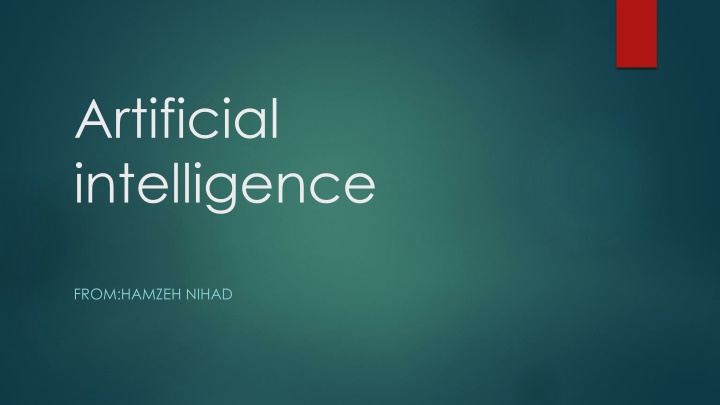
Artificial Intelligence: Applications, Advantages, and Disadvantages
Explore the world of artificial intelligence, its meaning, types, how it works, advantages, disadvantages, and the origin of AI through the pioneering work of Alan Turing. Delve into the impact of AI on human error, innovations, decision-making, and the potential risks involved. Uncover the various applications of AI, such as expert systems, machine learning, and more. Discover the implications of AI on society and the challenges it presents.
Download Presentation

Please find below an Image/Link to download the presentation.
The content on the website is provided AS IS for your information and personal use only. It may not be sold, licensed, or shared on other websites without obtaining consent from the author. If you encounter any issues during the download, it is possible that the publisher has removed the file from their server.
You are allowed to download the files provided on this website for personal or commercial use, subject to the condition that they are used lawfully. All files are the property of their respective owners.
The content on the website is provided AS IS for your information and personal use only. It may not be sold, licensed, or shared on other websites without obtaining consent from the author.
E N D
Presentation Transcript
Artificial intelligence FROM:HAMZEH NIHAD
What is the meaning of Artificial intelligence? Artificial intelligence is the simulation of human intelligence processes by machines, especially computer systems. Specific applications of AI include expert systems, natural language processing, speech recognition and machine vision.
How does it work ? AI works by combining large amounts of data with fast, iterative processing and intelligent algorithms, allowing the software to learn automatically from patterns or features in the data.
Types of artificial intelligence Purely Reactive. Limited Memory. Theory of Mind. Self-Aware. Machine Learning. Deep Learning. Input Layer. Hidden Layer.
who first created artificial intelligence ? The earliest substantial work in the field of artificial intelligence was done in the mid-20th century by the British logician and computer pioneer Alan Mathison Turing.
Advantages of Artificial Intelligence Reduction in Human Error. ... Zero Risks. ... 24x7 Availability. ... Digital Assistance. ... New Inventions. ... Unbiased Decisions. ... Perform Repetitive Jobs. ... Daily Applications.
Disadvantages of Artificial Intelligence High Costs. The ability to create a machine that can simulate human intelligence is no small feat. ... No creativity. A big disadvantage of AI is that it cannot learn to think outside the box. ... Unemployment. ... Make Humans Lazy. ... No Ethics. ... Emotionless. ... No Improvement.
Resources https://www.simplilearn.com/advantages-and-disadvantages-of- artificial-intelligence-article https://www.simplilearn.com/tutorials/artificial-intelligence-tutorial/what-is- artificial- intelligence#:~:text=A%20Brief%20History%20of%20Artificial%20Intelligen ce,- Here's%20a%20brief&text=1956%20%2D%20John%20McCarthy%20coin ed%20the,just%20a%20list https://en.wikipedia.org/wiki/Artificial_intelligence%20of%20instructions.
